Accounting System and Process: Ethical Dilemmas and Solutions
VerifiedAdded on 2022/09/28
|9
|1672
|26
Report
AI Summary
This report delves into the ethical considerations within accounting systems and processes. It begins by outlining the five core ethical principles as defined by the APESB Code of Ethics for Professional Accountants, including integrity, objectivity, professional competence and due care, confidentiality, and professional behavior, providing examples to illustrate each principle. The report then explores common ethical dilemmas encountered by accountants, such as fraudulent activities, confidentiality breaches, conflicts of interest, and pressures to manipulate financial statements. It provides a framework for addressing these dilemmas, including identifying legal issues, recognizing affected parties, and seeking professional advice. The report uses a case study of management's pressure to inflate revenue to demonstrate an ethical dilemma and suggests solutions to uphold professional ethics. References to relevant sources are also provided.
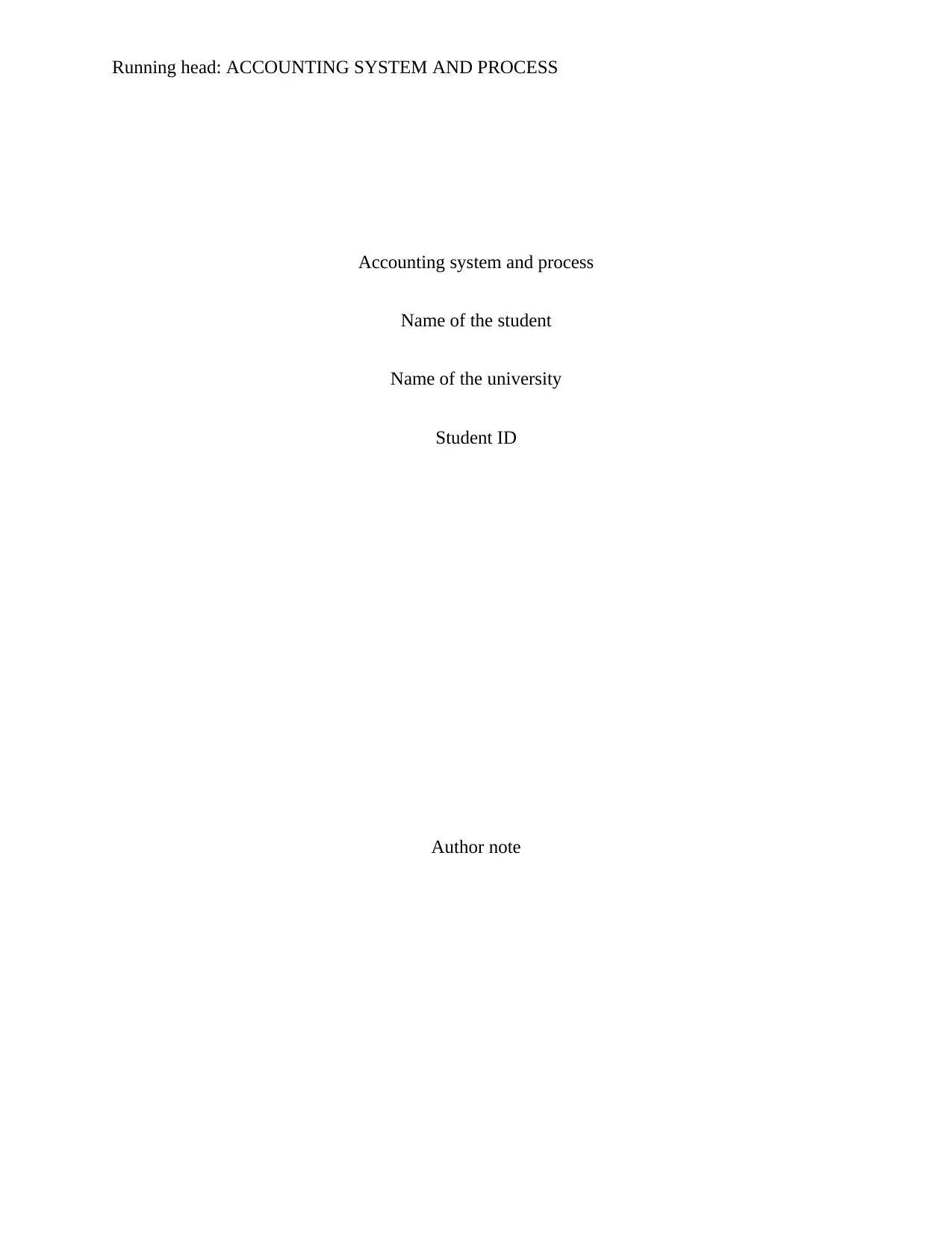
Running head: ACCOUNTING SYSTEM AND PROCESS
Accounting system and process
Name of the student
Name of the university
Student ID
Author note
Accounting system and process
Name of the student
Name of the university
Student ID
Author note
Paraphrase This Document
Need a fresh take? Get an instant paraphrase of this document with our AI Paraphraser
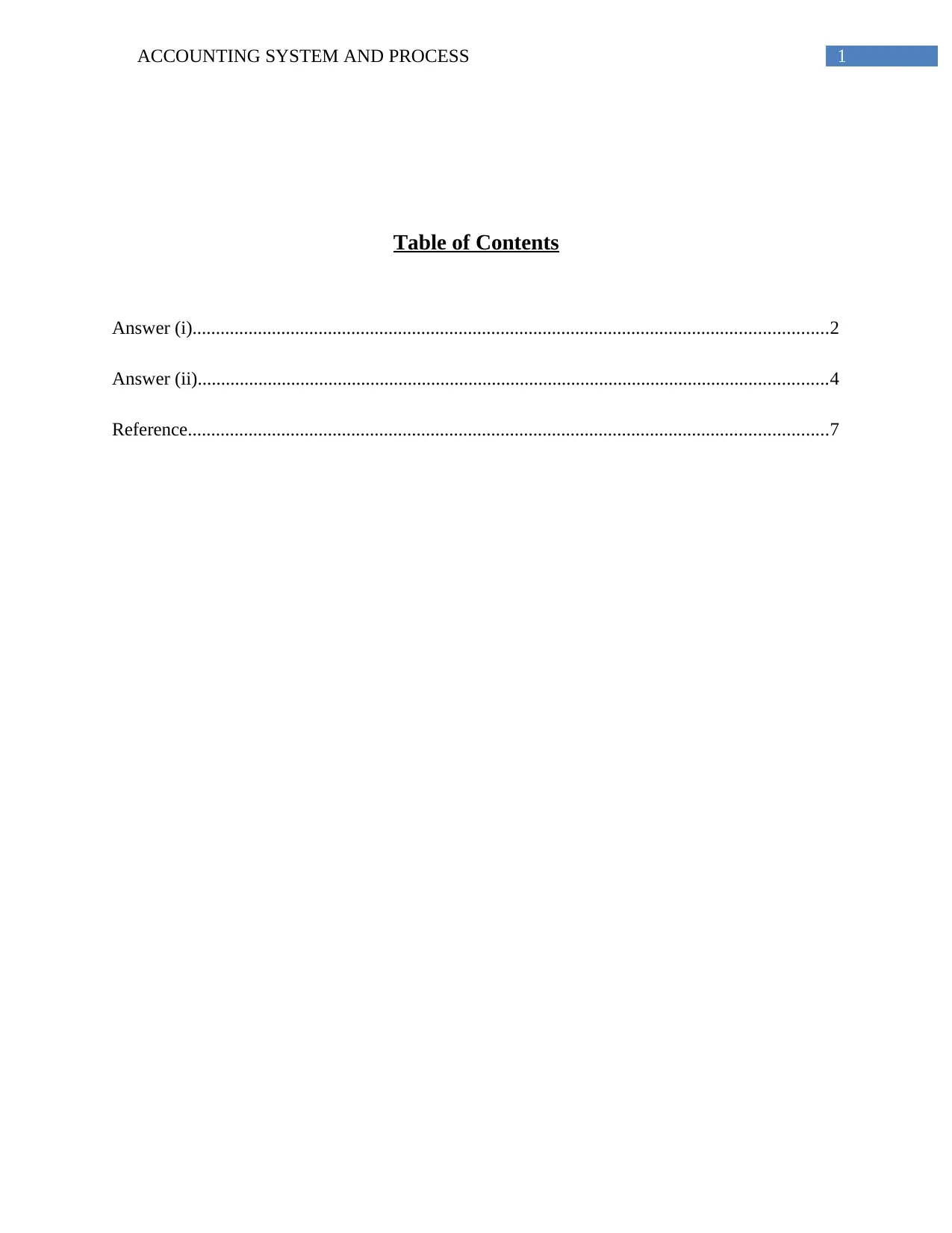
1ACCOUNTING SYSTEM AND PROCESS
Table of Contents
Answer (i)........................................................................................................................................2
Answer (ii).......................................................................................................................................4
Reference.........................................................................................................................................7
Table of Contents
Answer (i)........................................................................................................................................2
Answer (ii).......................................................................................................................................4
Reference.........................................................................................................................................7
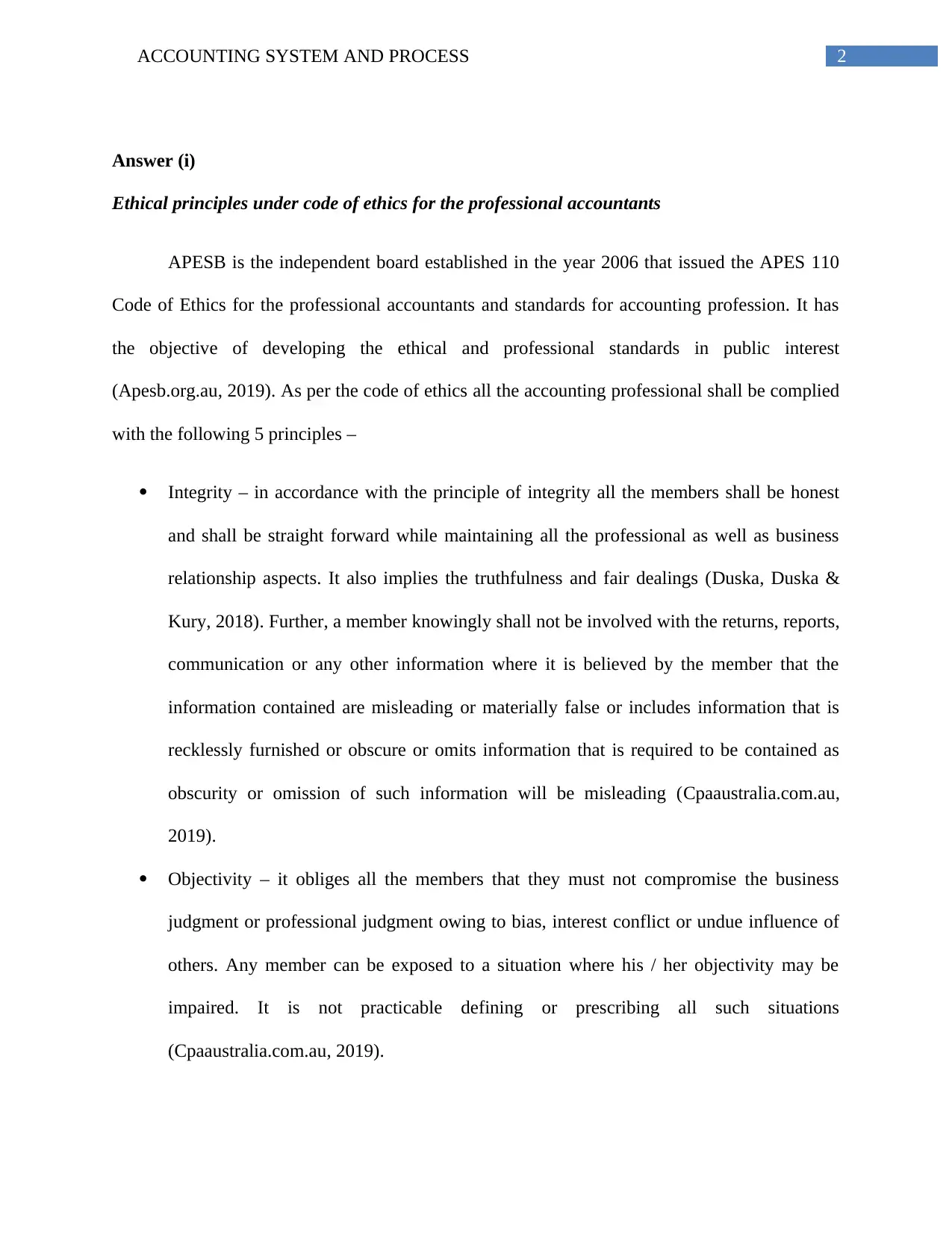
2ACCOUNTING SYSTEM AND PROCESS
Answer (i)
Ethical principles under code of ethics for the professional accountants
APESB is the independent board established in the year 2006 that issued the APES 110
Code of Ethics for the professional accountants and standards for accounting profession. It has
the objective of developing the ethical and professional standards in public interest
(Apesb.org.au, 2019). As per the code of ethics all the accounting professional shall be complied
with the following 5 principles –
Integrity – in accordance with the principle of integrity all the members shall be honest
and shall be straight forward while maintaining all the professional as well as business
relationship aspects. It also implies the truthfulness and fair dealings (Duska, Duska &
Kury, 2018). Further, a member knowingly shall not be involved with the returns, reports,
communication or any other information where it is believed by the member that the
information contained are misleading or materially false or includes information that is
recklessly furnished or obscure or omits information that is required to be contained as
obscurity or omission of such information will be misleading (Cpaaustralia.com.au,
2019).
Objectivity – it obliges all the members that they must not compromise the business
judgment or professional judgment owing to bias, interest conflict or undue influence of
others. Any member can be exposed to a situation where his / her objectivity may be
impaired. It is not practicable defining or prescribing all such situations
(Cpaaustralia.com.au, 2019).
Answer (i)
Ethical principles under code of ethics for the professional accountants
APESB is the independent board established in the year 2006 that issued the APES 110
Code of Ethics for the professional accountants and standards for accounting profession. It has
the objective of developing the ethical and professional standards in public interest
(Apesb.org.au, 2019). As per the code of ethics all the accounting professional shall be complied
with the following 5 principles –
Integrity – in accordance with the principle of integrity all the members shall be honest
and shall be straight forward while maintaining all the professional as well as business
relationship aspects. It also implies the truthfulness and fair dealings (Duska, Duska &
Kury, 2018). Further, a member knowingly shall not be involved with the returns, reports,
communication or any other information where it is believed by the member that the
information contained are misleading or materially false or includes information that is
recklessly furnished or obscure or omits information that is required to be contained as
obscurity or omission of such information will be misleading (Cpaaustralia.com.au,
2019).
Objectivity – it obliges all the members that they must not compromise the business
judgment or professional judgment owing to bias, interest conflict or undue influence of
others. Any member can be exposed to a situation where his / her objectivity may be
impaired. It is not practicable defining or prescribing all such situations
(Cpaaustralia.com.au, 2019).
⊘ This is a preview!⊘
Do you want full access?
Subscribe today to unlock all pages.

Trusted by 1+ million students worldwide
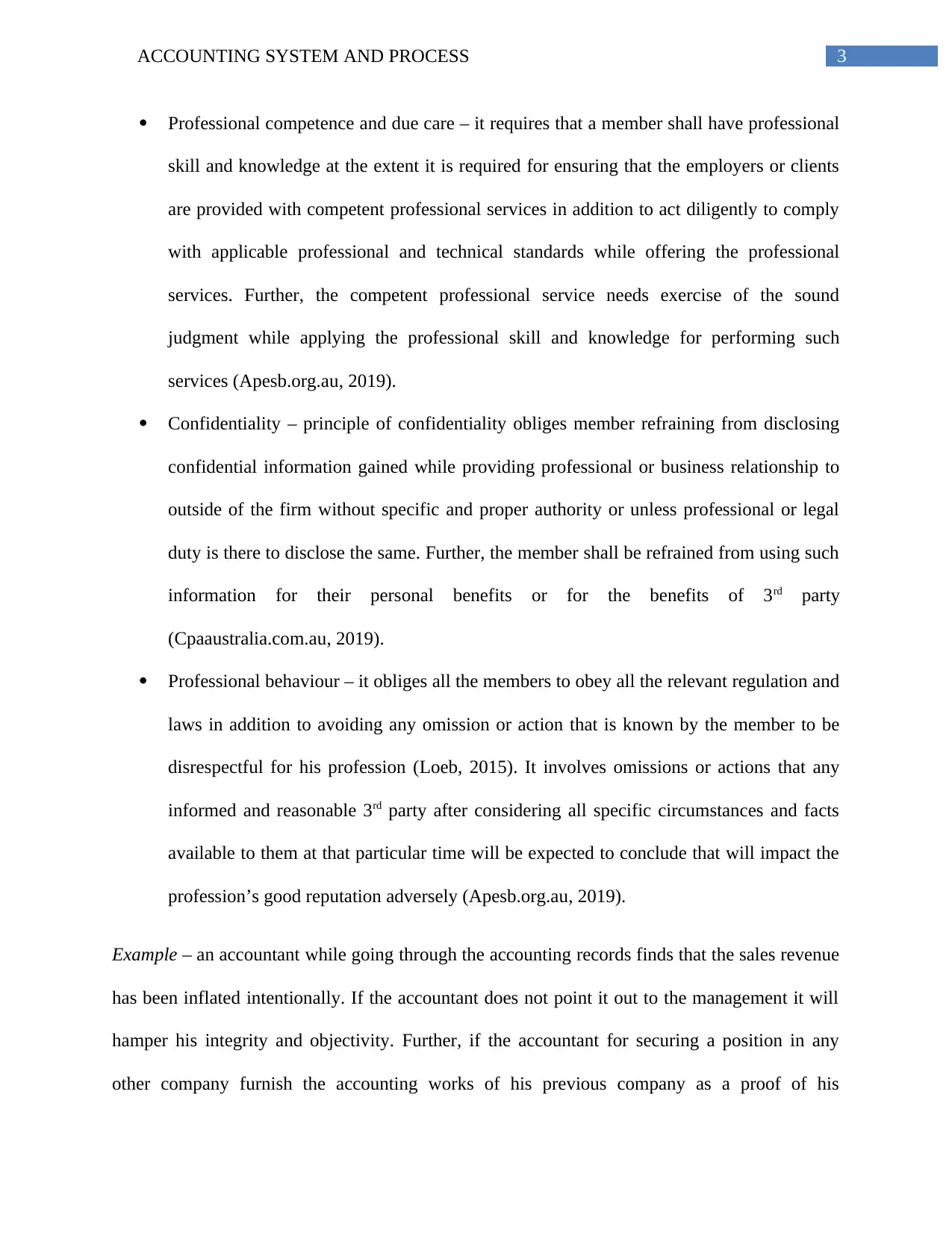
3ACCOUNTING SYSTEM AND PROCESS
Professional competence and due care – it requires that a member shall have professional
skill and knowledge at the extent it is required for ensuring that the employers or clients
are provided with competent professional services in addition to act diligently to comply
with applicable professional and technical standards while offering the professional
services. Further, the competent professional service needs exercise of the sound
judgment while applying the professional skill and knowledge for performing such
services (Apesb.org.au, 2019).
Confidentiality – principle of confidentiality obliges member refraining from disclosing
confidential information gained while providing professional or business relationship to
outside of the firm without specific and proper authority or unless professional or legal
duty is there to disclose the same. Further, the member shall be refrained from using such
information for their personal benefits or for the benefits of 3rd party
(Cpaaustralia.com.au, 2019).
Professional behaviour – it obliges all the members to obey all the relevant regulation and
laws in addition to avoiding any omission or action that is known by the member to be
disrespectful for his profession (Loeb, 2015). It involves omissions or actions that any
informed and reasonable 3rd party after considering all specific circumstances and facts
available to them at that particular time will be expected to conclude that will impact the
profession’s good reputation adversely (Apesb.org.au, 2019).
Example – an accountant while going through the accounting records finds that the sales revenue
has been inflated intentionally. If the accountant does not point it out to the management it will
hamper his integrity and objectivity. Further, if the accountant for securing a position in any
other company furnish the accounting works of his previous company as a proof of his
Professional competence and due care – it requires that a member shall have professional
skill and knowledge at the extent it is required for ensuring that the employers or clients
are provided with competent professional services in addition to act diligently to comply
with applicable professional and technical standards while offering the professional
services. Further, the competent professional service needs exercise of the sound
judgment while applying the professional skill and knowledge for performing such
services (Apesb.org.au, 2019).
Confidentiality – principle of confidentiality obliges member refraining from disclosing
confidential information gained while providing professional or business relationship to
outside of the firm without specific and proper authority or unless professional or legal
duty is there to disclose the same. Further, the member shall be refrained from using such
information for their personal benefits or for the benefits of 3rd party
(Cpaaustralia.com.au, 2019).
Professional behaviour – it obliges all the members to obey all the relevant regulation and
laws in addition to avoiding any omission or action that is known by the member to be
disrespectful for his profession (Loeb, 2015). It involves omissions or actions that any
informed and reasonable 3rd party after considering all specific circumstances and facts
available to them at that particular time will be expected to conclude that will impact the
profession’s good reputation adversely (Apesb.org.au, 2019).
Example – an accountant while going through the accounting records finds that the sales revenue
has been inflated intentionally. If the accountant does not point it out to the management it will
hamper his integrity and objectivity. Further, if the accountant for securing a position in any
other company furnish the accounting works of his previous company as a proof of his
Paraphrase This Document
Need a fresh take? Get an instant paraphrase of this document with our AI Paraphraser
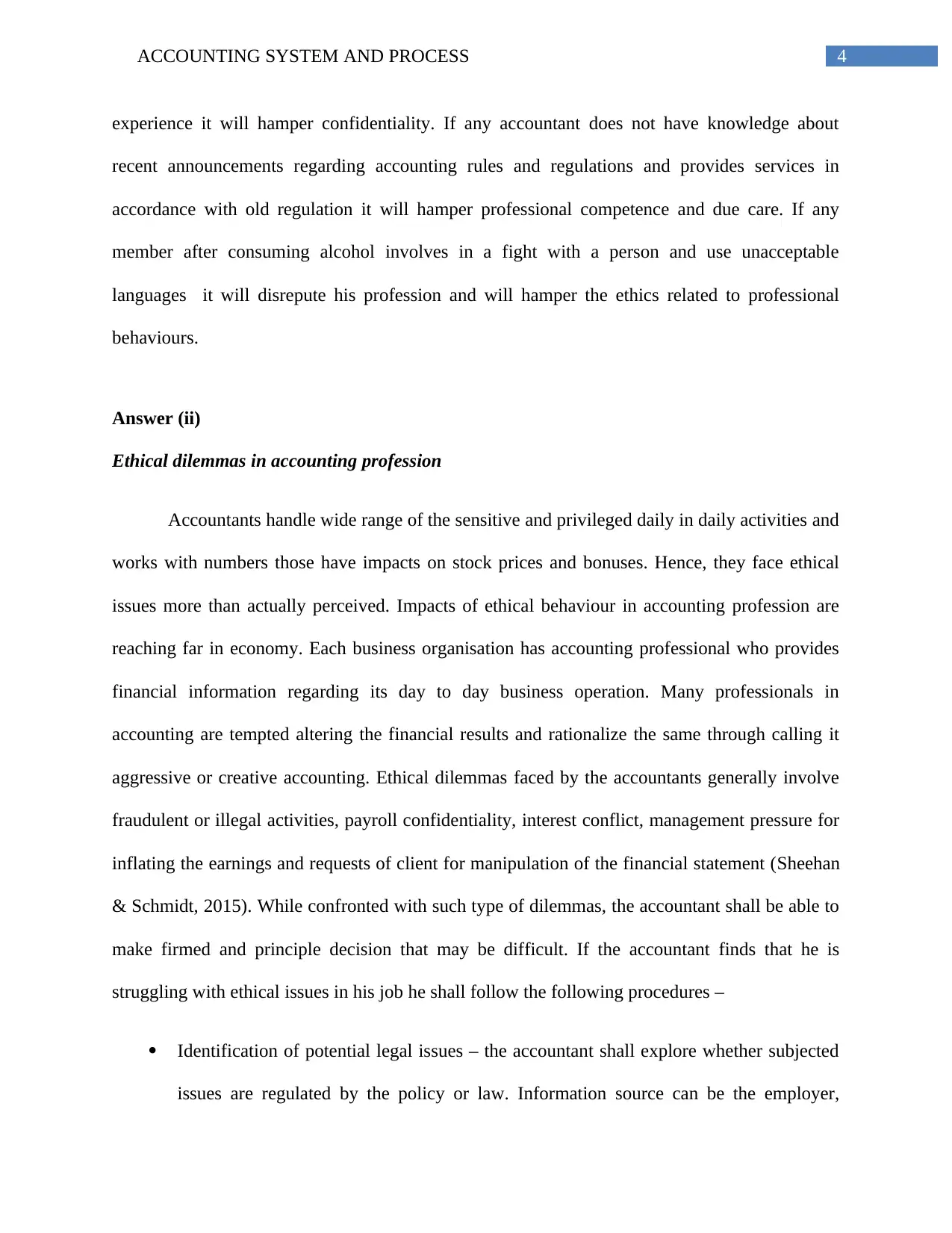
4ACCOUNTING SYSTEM AND PROCESS
experience it will hamper confidentiality. If any accountant does not have knowledge about
recent announcements regarding accounting rules and regulations and provides services in
accordance with old regulation it will hamper professional competence and due care. If any
member after consuming alcohol involves in a fight with a person and use unacceptable
languages it will disrepute his profession and will hamper the ethics related to professional
behaviours.
Answer (ii)
Ethical dilemmas in accounting profession
Accountants handle wide range of the sensitive and privileged daily in daily activities and
works with numbers those have impacts on stock prices and bonuses. Hence, they face ethical
issues more than actually perceived. Impacts of ethical behaviour in accounting profession are
reaching far in economy. Each business organisation has accounting professional who provides
financial information regarding its day to day business operation. Many professionals in
accounting are tempted altering the financial results and rationalize the same through calling it
aggressive or creative accounting. Ethical dilemmas faced by the accountants generally involve
fraudulent or illegal activities, payroll confidentiality, interest conflict, management pressure for
inflating the earnings and requests of client for manipulation of the financial statement (Sheehan
& Schmidt, 2015). While confronted with such type of dilemmas, the accountant shall be able to
make firmed and principle decision that may be difficult. If the accountant finds that he is
struggling with ethical issues in his job he shall follow the following procedures –
Identification of potential legal issues – the accountant shall explore whether subjected
issues are regulated by the policy or law. Information source can be the employer,
experience it will hamper confidentiality. If any accountant does not have knowledge about
recent announcements regarding accounting rules and regulations and provides services in
accordance with old regulation it will hamper professional competence and due care. If any
member after consuming alcohol involves in a fight with a person and use unacceptable
languages it will disrepute his profession and will hamper the ethics related to professional
behaviours.
Answer (ii)
Ethical dilemmas in accounting profession
Accountants handle wide range of the sensitive and privileged daily in daily activities and
works with numbers those have impacts on stock prices and bonuses. Hence, they face ethical
issues more than actually perceived. Impacts of ethical behaviour in accounting profession are
reaching far in economy. Each business organisation has accounting professional who provides
financial information regarding its day to day business operation. Many professionals in
accounting are tempted altering the financial results and rationalize the same through calling it
aggressive or creative accounting. Ethical dilemmas faced by the accountants generally involve
fraudulent or illegal activities, payroll confidentiality, interest conflict, management pressure for
inflating the earnings and requests of client for manipulation of the financial statement (Sheehan
& Schmidt, 2015). While confronted with such type of dilemmas, the accountant shall be able to
make firmed and principle decision that may be difficult. If the accountant finds that he is
struggling with ethical issues in his job he shall follow the following procedures –
Identification of potential legal issues – the accountant shall explore whether subjected
issues are regulated by the policy or law. Information source can be the employer,
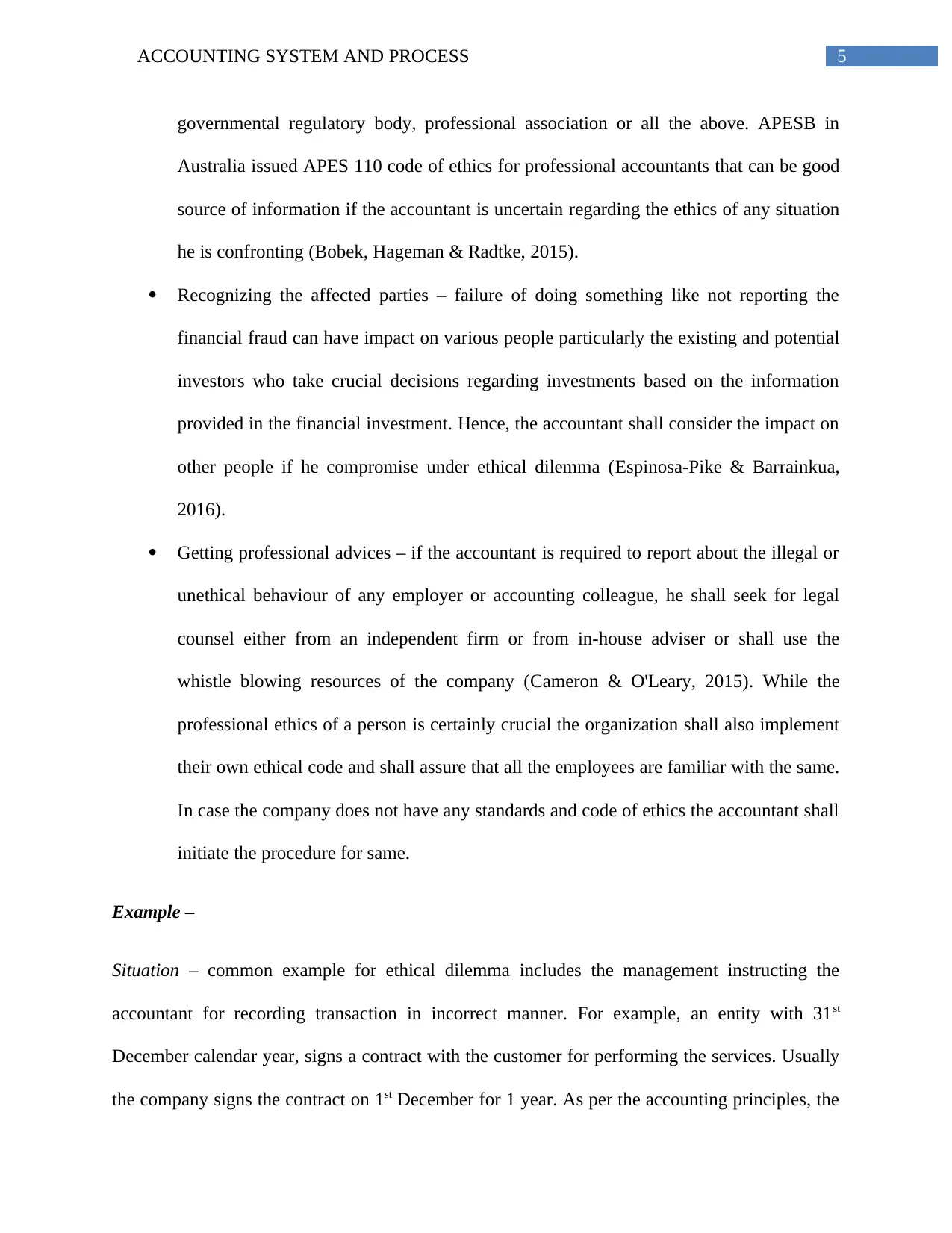
5ACCOUNTING SYSTEM AND PROCESS
governmental regulatory body, professional association or all the above. APESB in
Australia issued APES 110 code of ethics for professional accountants that can be good
source of information if the accountant is uncertain regarding the ethics of any situation
he is confronting (Bobek, Hageman & Radtke, 2015).
Recognizing the affected parties – failure of doing something like not reporting the
financial fraud can have impact on various people particularly the existing and potential
investors who take crucial decisions regarding investments based on the information
provided in the financial investment. Hence, the accountant shall consider the impact on
other people if he compromise under ethical dilemma (Espinosa-Pike & Barrainkua,
2016).
Getting professional advices – if the accountant is required to report about the illegal or
unethical behaviour of any employer or accounting colleague, he shall seek for legal
counsel either from an independent firm or from in-house adviser or shall use the
whistle blowing resources of the company (Cameron & O'Leary, 2015). While the
professional ethics of a person is certainly crucial the organization shall also implement
their own ethical code and shall assure that all the employees are familiar with the same.
In case the company does not have any standards and code of ethics the accountant shall
initiate the procedure for same.
Example –
Situation – common example for ethical dilemma includes the management instructing the
accountant for recording transaction in incorrect manner. For example, an entity with 31st
December calendar year, signs a contract with the customer for performing the services. Usually
the company signs the contract on 1st December for 1 year. As per the accounting principles, the
governmental regulatory body, professional association or all the above. APESB in
Australia issued APES 110 code of ethics for professional accountants that can be good
source of information if the accountant is uncertain regarding the ethics of any situation
he is confronting (Bobek, Hageman & Radtke, 2015).
Recognizing the affected parties – failure of doing something like not reporting the
financial fraud can have impact on various people particularly the existing and potential
investors who take crucial decisions regarding investments based on the information
provided in the financial investment. Hence, the accountant shall consider the impact on
other people if he compromise under ethical dilemma (Espinosa-Pike & Barrainkua,
2016).
Getting professional advices – if the accountant is required to report about the illegal or
unethical behaviour of any employer or accounting colleague, he shall seek for legal
counsel either from an independent firm or from in-house adviser or shall use the
whistle blowing resources of the company (Cameron & O'Leary, 2015). While the
professional ethics of a person is certainly crucial the organization shall also implement
their own ethical code and shall assure that all the employees are familiar with the same.
In case the company does not have any standards and code of ethics the accountant shall
initiate the procedure for same.
Example –
Situation – common example for ethical dilemma includes the management instructing the
accountant for recording transaction in incorrect manner. For example, an entity with 31st
December calendar year, signs a contract with the customer for performing the services. Usually
the company signs the contract on 1st December for 1 year. As per the accounting principles, the
⊘ This is a preview!⊘
Do you want full access?
Subscribe today to unlock all pages.

Trusted by 1+ million students worldwide
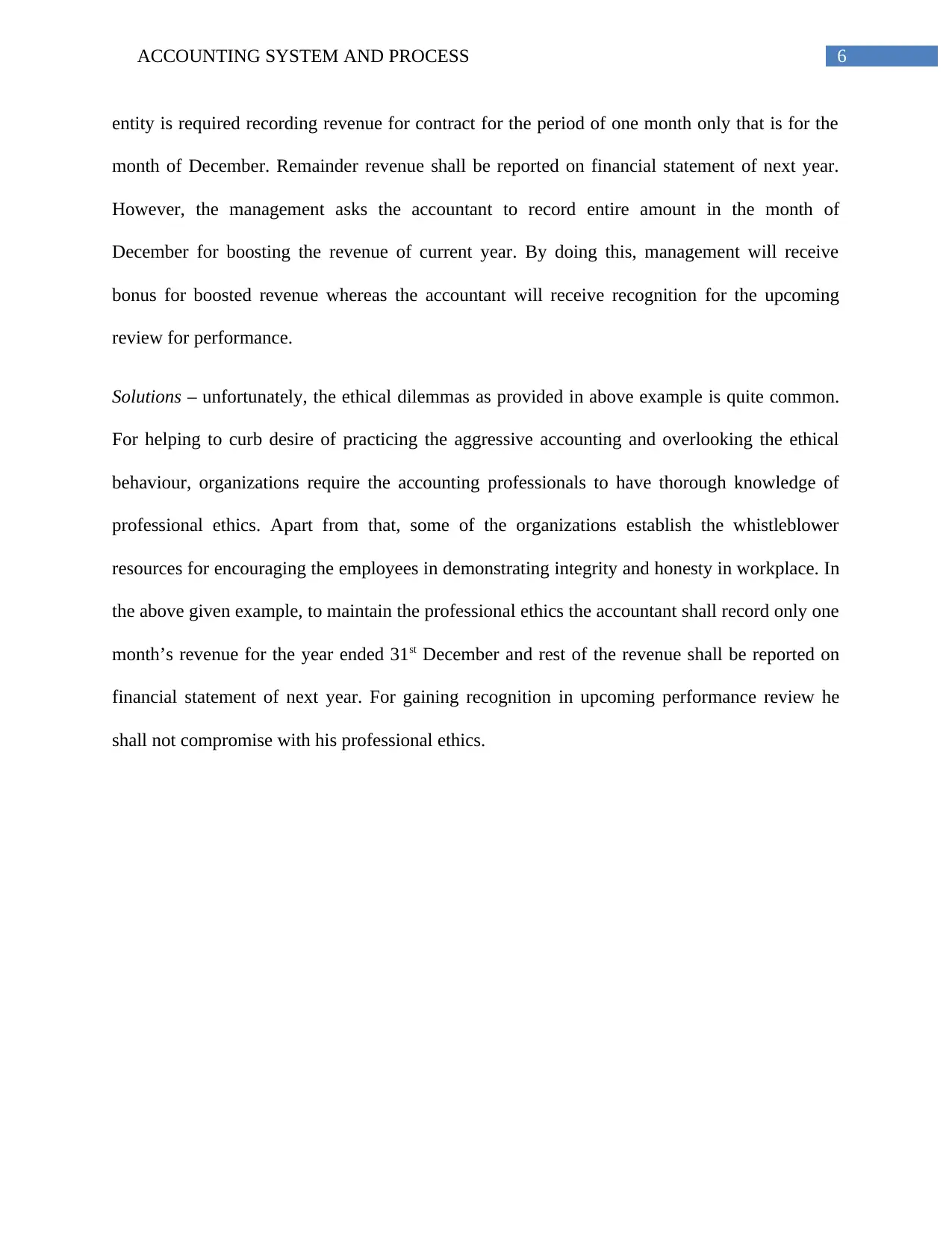
6ACCOUNTING SYSTEM AND PROCESS
entity is required recording revenue for contract for the period of one month only that is for the
month of December. Remainder revenue shall be reported on financial statement of next year.
However, the management asks the accountant to record entire amount in the month of
December for boosting the revenue of current year. By doing this, management will receive
bonus for boosted revenue whereas the accountant will receive recognition for the upcoming
review for performance.
Solutions – unfortunately, the ethical dilemmas as provided in above example is quite common.
For helping to curb desire of practicing the aggressive accounting and overlooking the ethical
behaviour, organizations require the accounting professionals to have thorough knowledge of
professional ethics. Apart from that, some of the organizations establish the whistleblower
resources for encouraging the employees in demonstrating integrity and honesty in workplace. In
the above given example, to maintain the professional ethics the accountant shall record only one
month’s revenue for the year ended 31st December and rest of the revenue shall be reported on
financial statement of next year. For gaining recognition in upcoming performance review he
shall not compromise with his professional ethics.
entity is required recording revenue for contract for the period of one month only that is for the
month of December. Remainder revenue shall be reported on financial statement of next year.
However, the management asks the accountant to record entire amount in the month of
December for boosting the revenue of current year. By doing this, management will receive
bonus for boosted revenue whereas the accountant will receive recognition for the upcoming
review for performance.
Solutions – unfortunately, the ethical dilemmas as provided in above example is quite common.
For helping to curb desire of practicing the aggressive accounting and overlooking the ethical
behaviour, organizations require the accounting professionals to have thorough knowledge of
professional ethics. Apart from that, some of the organizations establish the whistleblower
resources for encouraging the employees in demonstrating integrity and honesty in workplace. In
the above given example, to maintain the professional ethics the accountant shall record only one
month’s revenue for the year ended 31st December and rest of the revenue shall be reported on
financial statement of next year. For gaining recognition in upcoming performance review he
shall not compromise with his professional ethics.
Paraphrase This Document
Need a fresh take? Get an instant paraphrase of this document with our AI Paraphraser
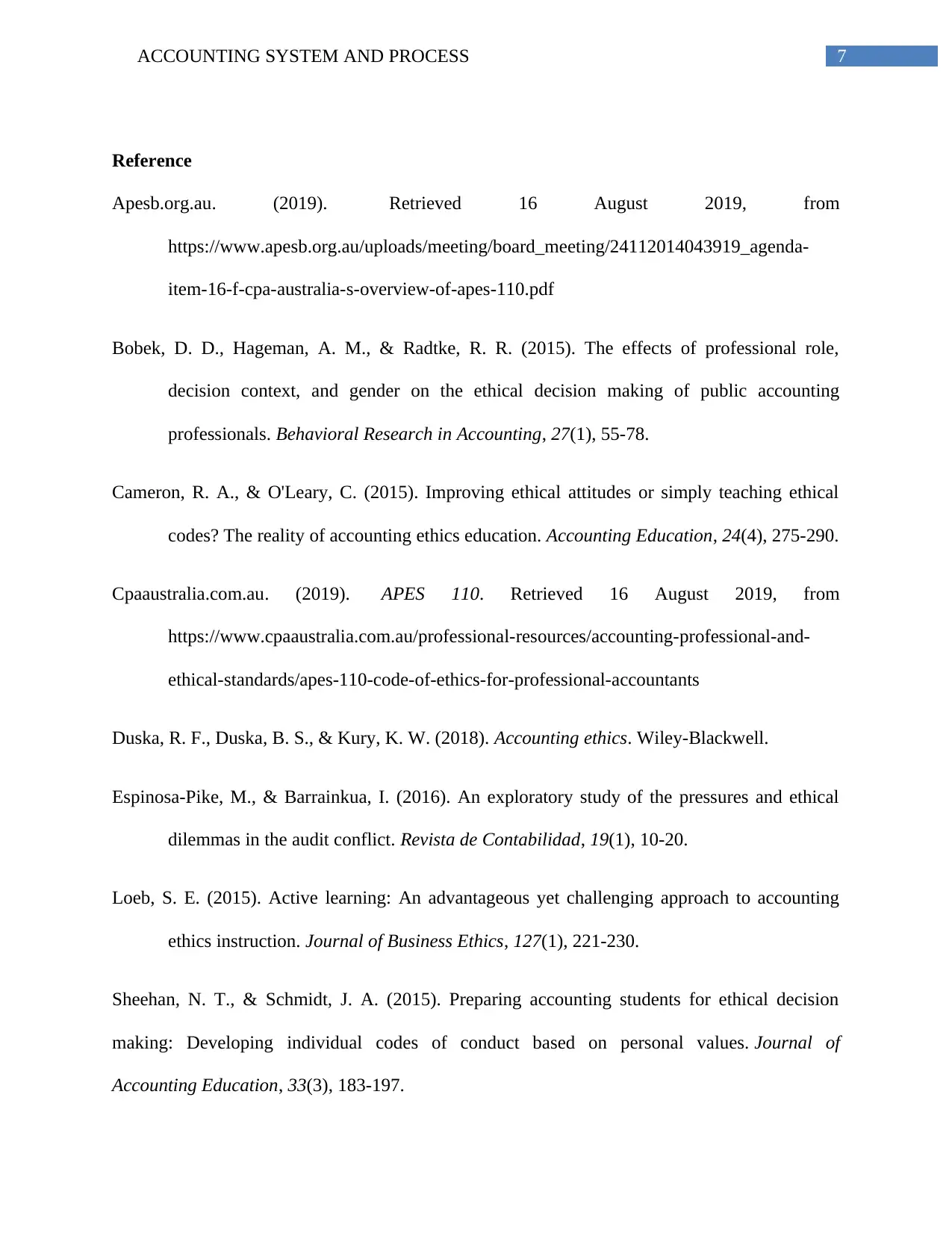
7ACCOUNTING SYSTEM AND PROCESS
Reference
Apesb.org.au. (2019). Retrieved 16 August 2019, from
https://www.apesb.org.au/uploads/meeting/board_meeting/24112014043919_agenda-
item-16-f-cpa-australia-s-overview-of-apes-110.pdf
Bobek, D. D., Hageman, A. M., & Radtke, R. R. (2015). The effects of professional role,
decision context, and gender on the ethical decision making of public accounting
professionals. Behavioral Research in Accounting, 27(1), 55-78.
Cameron, R. A., & O'Leary, C. (2015). Improving ethical attitudes or simply teaching ethical
codes? The reality of accounting ethics education. Accounting Education, 24(4), 275-290.
Cpaaustralia.com.au. (2019). APES 110. Retrieved 16 August 2019, from
https://www.cpaaustralia.com.au/professional-resources/accounting-professional-and-
ethical-standards/apes-110-code-of-ethics-for-professional-accountants
Duska, R. F., Duska, B. S., & Kury, K. W. (2018). Accounting ethics. Wiley-Blackwell.
Espinosa-Pike, M., & Barrainkua, I. (2016). An exploratory study of the pressures and ethical
dilemmas in the audit conflict. Revista de Contabilidad, 19(1), 10-20.
Loeb, S. E. (2015). Active learning: An advantageous yet challenging approach to accounting
ethics instruction. Journal of Business Ethics, 127(1), 221-230.
Sheehan, N. T., & Schmidt, J. A. (2015). Preparing accounting students for ethical decision
making: Developing individual codes of conduct based on personal values. Journal of
Accounting Education, 33(3), 183-197.
Reference
Apesb.org.au. (2019). Retrieved 16 August 2019, from
https://www.apesb.org.au/uploads/meeting/board_meeting/24112014043919_agenda-
item-16-f-cpa-australia-s-overview-of-apes-110.pdf
Bobek, D. D., Hageman, A. M., & Radtke, R. R. (2015). The effects of professional role,
decision context, and gender on the ethical decision making of public accounting
professionals. Behavioral Research in Accounting, 27(1), 55-78.
Cameron, R. A., & O'Leary, C. (2015). Improving ethical attitudes or simply teaching ethical
codes? The reality of accounting ethics education. Accounting Education, 24(4), 275-290.
Cpaaustralia.com.au. (2019). APES 110. Retrieved 16 August 2019, from
https://www.cpaaustralia.com.au/professional-resources/accounting-professional-and-
ethical-standards/apes-110-code-of-ethics-for-professional-accountants
Duska, R. F., Duska, B. S., & Kury, K. W. (2018). Accounting ethics. Wiley-Blackwell.
Espinosa-Pike, M., & Barrainkua, I. (2016). An exploratory study of the pressures and ethical
dilemmas in the audit conflict. Revista de Contabilidad, 19(1), 10-20.
Loeb, S. E. (2015). Active learning: An advantageous yet challenging approach to accounting
ethics instruction. Journal of Business Ethics, 127(1), 221-230.
Sheehan, N. T., & Schmidt, J. A. (2015). Preparing accounting students for ethical decision
making: Developing individual codes of conduct based on personal values. Journal of
Accounting Education, 33(3), 183-197.
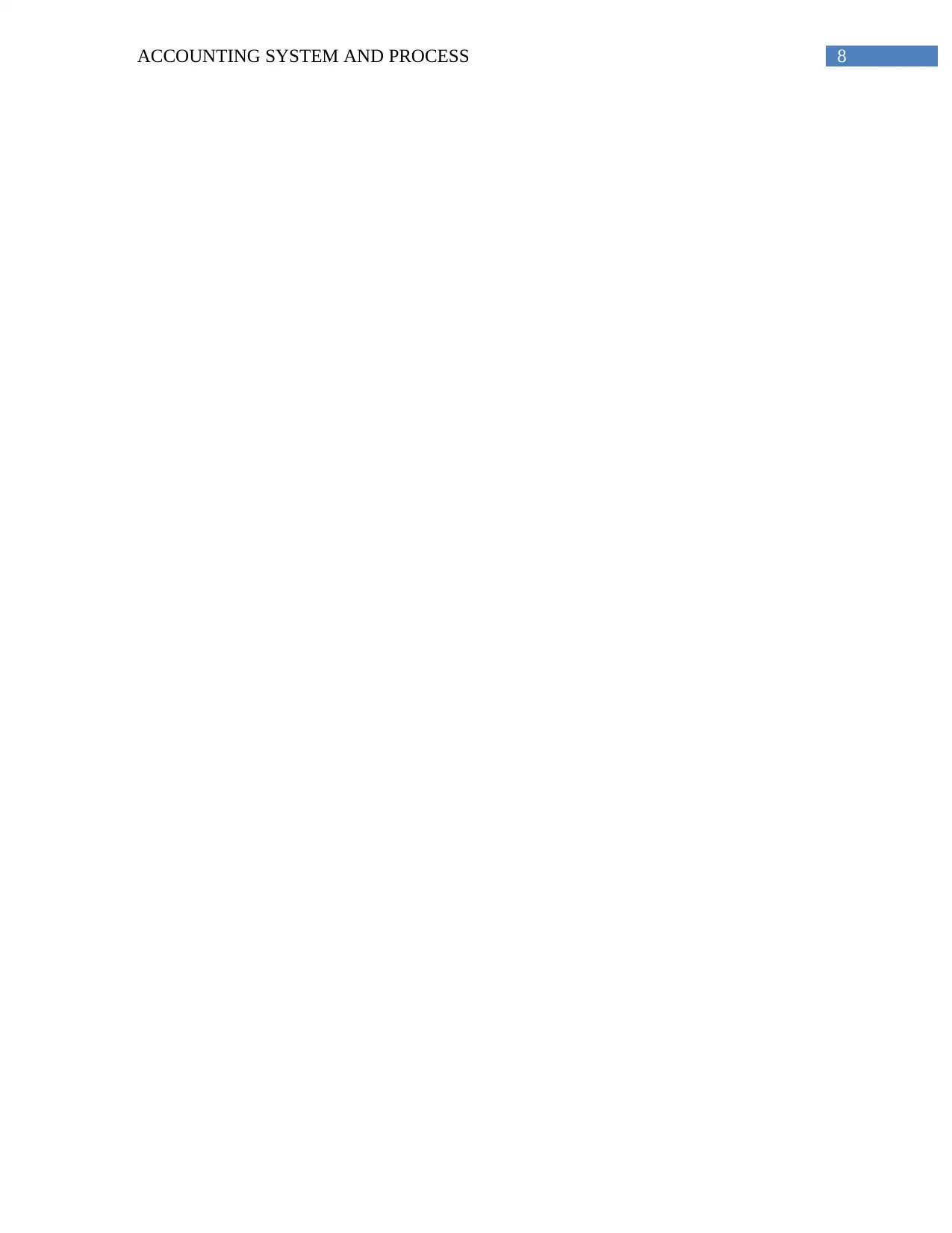
8ACCOUNTING SYSTEM AND PROCESS
⊘ This is a preview!⊘
Do you want full access?
Subscribe today to unlock all pages.

Trusted by 1+ million students worldwide
1 out of 9
Related Documents
Your All-in-One AI-Powered Toolkit for Academic Success.
+13062052269
info@desklib.com
Available 24*7 on WhatsApp / Email
![[object Object]](/_next/static/media/star-bottom.7253800d.svg)
Unlock your academic potential
Copyright © 2020–2026 A2Z Services. All Rights Reserved. Developed and managed by ZUCOL.





